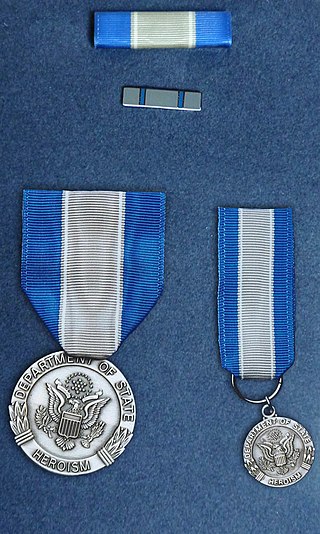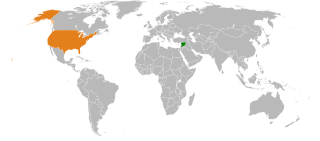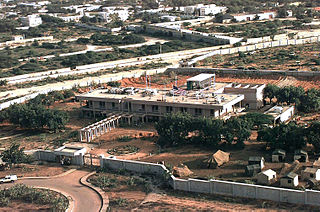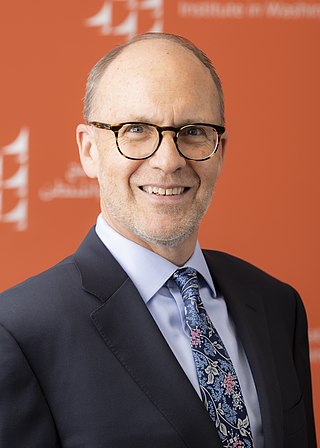Since 1980, the foreign relations of Iraq have been influenced by a number of controversial decisions by the Saddam Hussein administration. Hussein had good relations with the Soviet Union and a number of western countries such as France and Germany, who provided him with advanced weapons systems. He also developed a tenuous relation with the United States, who supported him during the Iran–Iraq War. However, the Invasion of Kuwait that triggered the Gulf War brutally changed Iraq's relations with the Arab World and the West. Egypt, Saudi Arabia, Syria and others were among the countries that supported Kuwait in the UN coalition. After the Hussein administration was toppled by the 2003 U.S. invasion, the governments that succeeded it have now tried to establish relations with various nations.

The foreign relations of Jordan have been consistently a pro-Western foreign policy.

Since its independence in 1961, Kuwait maintained strong international relations with most countries, especially nations within the Arab world. Its vast oil reserves gives it a prominent voice in global economic forums and organizations like the OPEC. Kuwait is also a major ally of ASEAN, a regional ally of China, and a major non-NATO ally.

Ryan Clark Crocker is a retired American diplomat who served as a career ambassador within the United States Foreign Service. A recipient of the Presidential Medal of Freedom, he served as United States ambassador to Afghanistan (2011–2012), Iraq (2007–2009), Pakistan (2004–2007), Syria (1998–2001), Kuwait (1994–1997), and Lebanon (1990–1993). In January 2010, he became dean of Texas A&M University's George Bush School of Government and Public Service.

Yuli Mikhailovich Vorontsov was a Soviet and Russian diplomat, President of International Centre of the Roerichs (Moscow). In the mid-1970s he was Chargé d'Affaires at the Soviet embassy in Washington under Ambassador Dobrynin. He was then Ambassador to India (1978-1983) and France (1983-1986). He returned to Moscow to be the first deputy foreign minister (1986-1990) and participated in arms reduction talks with the United States. In 1988-1989, he was simultaneously the Ambassador to Afghanistan as Soviet troops withdrew from the country. He then served as the last Soviet ambassador to United Nations between 1990 and 1991 and as the first Russian Permanent Representative to the UN from 1991 to 1994. After this he served as the Russian ambassador to the United States from 1994 to 1998. In 2000 Vorontsov was chosen as the high-level coordinator for issues related to a paragraph of United Nations Security Council Resolution 1284 which once again required Iraq to face "its obligations regarding the repatriation or return of all Kuwaiti and third country nationals or their remains, [and] the return of all Kuwaiti property [...] seized by Iraq".
Operation Eastern Exit was the codename given to the military evacuation of the United States embassy in Mogadishu, the capital of Somalia, in January 1991. In late December 1990, violence quickly enveloped the city as armed militants began clashing with government soldiers. On 1 January 1991, the US Ambassador to Somalia, James Keough Bishop, contacted the Department of State requesting an evacuation of the embassy, which was approved the following day. United States Central Command began planning and mobilizing forces that evening. The initial plan was to evacuate with a military transport plane through the Mogadishu International Airport, but this was later abandoned. A helicopter evacuation via the USS Guam and USS Trenton was the remaining option.

The Embassy of the United States of America in Baghdad is the diplomatic mission of the United States of America in the Republic of Iraq. Ambassador Alina Romanowski is currently the chief of mission.

Emil Skodon, former United States diplomat and a career foreign service officer. He was the U.S. ambassador to Brunei until August 1, 2008. He was sworn in as ambassador on September 7, 2005, and presented his credentials to the Sultan of Brunei on November 1. A career diplomat and Minister Counselor in the Senior United States Foreign Service, Skodon had previously been Deputy Chief of Mission at the American Embassy in Rome, Italy, since August 2002. He retired from the Foreign Service following his service in Brunei and is currently an independent consultant living in Washington, DC.

The Award for Heroism is an award of the United States Department of State. It is presented to employees of State, USAID and Marine guards assigned to diplomatic and consular facilities in recognition of acts of courage or outstanding performance under unusually difficult or dangerous circumstances, whether or not in connection with the performance of assigned duties.

Kuwait is a designated major non-NATO ally of the United States.

Diplomatic relations between Syria and the United States are currently non-existent; they were suspended in 2012 after the onset of the Syrian Civil War. Priority issues between the two states include the Arab–Israeli conflict, the Golan Heights annexation, Iraq War, alleged state-sponsorship of terrorism, occupation of Lebanon, etc.

Diplomatic relations between Iraq and the United States began when the U.S. first recognized Iraq on January 9, 1930, with the signing of the Anglo-American-Iraqi Convention in London by Charles G. Dawes, U.S. Ambassador to the United Kingdom. The historiography of Iraq—United States relations prior to the 1980s is considered relatively underdeveloped, with the first in-depth academic studies being published in the 2010s. Today, the United States and Iraq both consider themselves as strategic partners, given the American political and military involvement after the invasion of Iraq and their mutual, deep-rooted relationship that followed. The United States provides the Iraqi security forces hundreds of millions of dollars of military aid and training annually as well as uses its military bases.

Iraq and Pakistan established diplomatic relations in 1947. Cultural interaction and economic trade between Mesopotamia and the Indus Valley date back to 1800 BCE. In 1955, both Iraq and Pakistan joined the Baghdad Pact, a military alliance against the Soviet Union. However, when the king of Iraq was assassinated in 1958, Iraq pulled out of the Baghdad Pact, which was subsequently renamed to the Central Treaty Organization (CENTO). During the Ba'athist era, relations were at times cordial and sometimes hostile. However, following the 2003 invasion of Iraq that toppled the Ba'athist government, bilateral relations have stabilized; Pakistan has supported Iraq in its fight against the Islamic State and other militant groups active in the Iraqi conflict. Iraq maintains an embassy in Islamabad while Pakistan maintains an embassy in Baghdad.

The Embassy of the United States to Bahrain is the diplomatic mission of the United States in Bahrain. The building is located in Zinj, a district of the capital, Manama. The post of U.S. Ambassador to Bahrain is currently held by Steven C. Bondy.

The Embassy of the United States of America in Dar es Salaam is the diplomatic mission of the United States in Tanzania.

The Embassy of the United States of America to Somalia is a diplomatic mission of the United States in Mogadishu, Somalia from 1960 to 1991. In 1957, the US opened a consulate-general in Mogadishu—the capital of the Trust Territory of Somalia, a UN trusteeship under Italian administration. The consulate was upgraded to embassy status in July 1960, when the US recognized Somalia's independence and appointed an ambassador. The embassy served to counter Soviet influence during the Cold War and also served as a base for the United States Agency for International Development, which had a large presence in the country. In 1989, the embassy moved from a dilapidated building in central Mogadishu to a new compound on the outskirts of the city.

The Embassy of the United States in Lisbon is the embassy of the United States in Portugal, in the capital city of Lisbon. It is located on Avenida das Forças Armadas.

Douglas Alan Silliman is the president of the Arab Gulf States Institute in Washington and a former American diplomat who served as United States Ambassador to Kuwait (2014-16) and Iraq (2016-19).

















